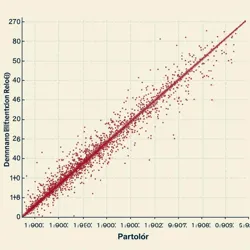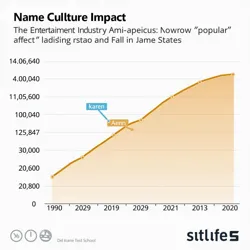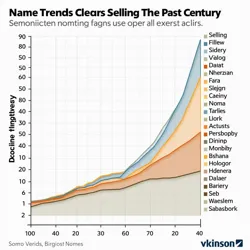Name Extinction Events: When Popular Names Fade into History
 A statistical visualization showing the sharp decline in the name "Adolf" in German-speaking countries between 1932 and 1945
A statistical visualization showing the sharp decline in the name "Adolf" in German-speaking countries between 1932 and 1945Throughout history, certain given names have experienced dramatic declines in popularity, often tied to specific historical events, controversial figures, or cultural shifts. This phenomenon, known as nominal extinction, occurs when previously common names become rare or virtually disappear from use within a particular culture or region. These dramatic shifts in naming patterns provide fascinating insights into how societies process historical trauma, cultural change, and collective memory.
Historical Impact on Name Choices
One of the most documented cases of name abandonment occurred with the name Adolf, which virtually disappeared from use in German-speaking countries after World War II. Prior to the 1930s, it had been a relatively common Germanic name, with historical roots meaning "noble wolf." The name's association with Adolf Hitler led to its near-complete abandonment, with usage dropping by over 99% in Germany between 1932 and 1945. Similar patterns have been observed with other names associated with notorious historical figures, demonstrating how nominal avoidance can serve as a form of collective social response to historical trauma.
The name Katrina provides a more recent example of weather-related name decline. Following Hurricane Katrina in 2005, the name experienced a significant drop in popularity in the United States, particularly in the Gulf Coast region. This illustrates how natural disasters can impact naming choices, especially when events receive extensive media coverage and become deeply embedded in cultural memory.
Cultural and Entertainment Influences
 Trending data showing the rise and fall of the name "Karen" in the United States from 1950-2020
Trending data showing the rise and fall of the name "Karen" in the United States from 1950-2020The entertainment industry and popular culture have repeatedly demonstrated their power to affect naming trends. The name Karen has experienced a dramatic decline since 2019 due to its association with a negative social stereotype. This represents a modern example of how internet culture and social media can accelerate name stigmatization, leading to rapid shifts in naming preferences.
The phenomenon of fictional character impact has been observed with names like Damien, which saw a significant decline following the 1976 release of the horror film "The Omen." Similarly, the name Delilah experienced historical periods of unpopularity in Judeo-Christian societies due to its biblical associations, though it has seen some revival in recent decades.
Technological and Social Evolution
Modern communication technologies and social media have accelerated the pace at which names can fall from favor. The digital name effect describes how online phenomena can rapidly influence naming choices across global communities. This has led to the development of predictive naming analytics, which attempt to forecast potential name extinctions based on social media trends and cultural patterns.
Recovery and Rehabilitation
Some names have demonstrated the ability to recover from temporary decline, a phenomenon known as nominal resurrection. For example, the name Mary, despite experiencing significant drops in popularity since its peak in the early 20th century, maintains a steady presence in many English-speaking countries due to its religious and historical significance.
Linguistic and Demographic Factors
The study of name extinction patterns reveals complex interactions between linguistics, demographics, and social change. Names that were once considered traditional in certain cultures may fade as populations become more diverse and globally connected. The cross-cultural naming influence can lead to the gradual displacement of names associated with specific ethnic or religious traditions.
Research in onomastic preservation has identified several factors that contribute to name resilience, including:
-
Strong cultural or religious significance
-
Positive historical associations
-
Linguistic simplicity and adaptability
Geographical Variations
The process of name extinction often varies significantly by region and culture. The regional name retention effect describes how certain names may persist in specific geographical areas while disappearing elsewhere. This phenomenon is particularly evident in areas with strong cultural traditions or isolated communities.
Modern Documentation and Research
Contemporary naming pattern analysis benefits from extensive digital records and sophisticated statistical tools. The field of computational onomastics has emerged to study these trends systematically, using big data approaches to track and analyze naming patterns across different cultures and time periods.
Prevention and Awareness
Some communities have implemented cultural name preservation initiatives to prevent the extinction of traditional names. These efforts often involve educational programs, cultural celebrations, and documentation of naming histories and meanings. The nominal heritage movement works to maintain connections to historical naming practices while acknowledging modern sensibilities.
The study of name extinction events continues to evolve as researchers develop new tools and methodologies for tracking and understanding these cultural shifts. The intersection of historical events, popular culture, and social change provides valuable insights into how societies process and respond to significant events through their naming choices.
As global communication continues to influence cultural practices, the pace of name extinction events may accelerate, making the documentation and understanding of these phenomena increasingly important for cultural historians and social scientists. The field of extinction onomastics remains an active area of research, offering insights into the complex relationships between names, identity, and social change.
 A comparative visualization showing the decline patterns of multiple historically significant names over the past century
A comparative visualization showing the decline patterns of multiple historically significant names over the past centuryThis evolving understanding of how and why names fall from popular use provides valuable insights into cultural memory, social psychology, and the complex ways in which societies process historical events and cultural change. The continued study of these patterns helps researchers better understand both historical social dynamics and predict future naming trends.